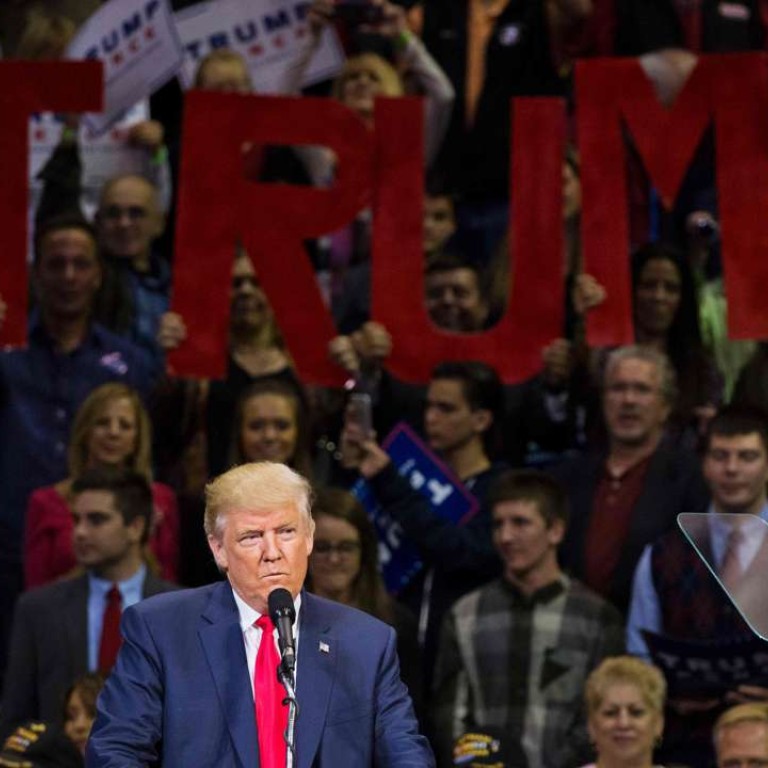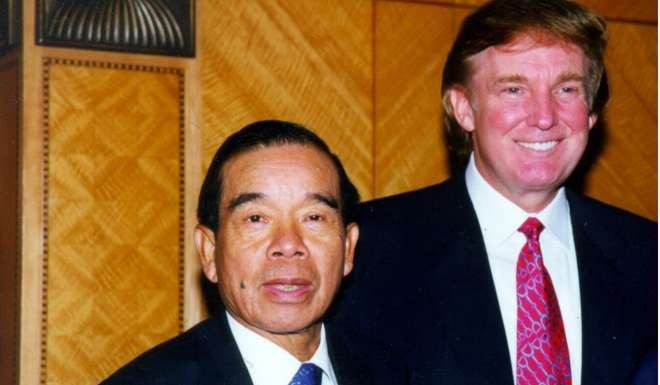
Real estate failures and lawsuits: did setbacks in China scar tough-talking Donald Trump?
US presidential candidate has failed to crack Chinese market over the years
As a US presidential candidate, Donald Trump likes to talk tough on China by threatening to start a trade war. As a businessman, he’s failed more than once to crack into the China market.
One failure was in real estate, when Trump’s short-lived partnership with China’s biggest property developer went nowhere, and he’s also failed to launch his hotel brand in China. Trump also lost a big lawsuit to Hong Kong property tycoons who helped him in the 1990s. His one major success in China was winning a legal battle banning a Macau restaurant operator from using the name “Trump”.
If one day he sits in the Oval Office, he will do what a US president is supposed to do
It’s not known how personally committed or involved Trump was in his conglomerate’s Chinese failures, and there could be many reasons the deals were thwarted. But analysts and researchers said Trump’s fruitless efforts to gain from a booming China market and shrewd Chinese business partners might have affected the Republican presidential candidate’s attitude towards China, America’s biggest trading partner and a growing geopolitical rival in Asia, as he vies for the most powerful office in the world.
Yuan Zheng, an American affairs expert at the Chinese Academy of Social Sciences, said the failed business forays might have given Trump a “bad impression of China”.

“We need to look at if these reasons are commercial or political – if it’s purely business, I don’t think it will affect his opinion of China that much,” Yuan said. “On the other hand, if it’s the investment environment or other policy-related reasons [that led to his failed business attempts in China], that may leave him with a bad impression of China.”
Trump had the chance to link his name to the tallest building in Guangzhou in 2008 when he formed a partnership with China Evergrande Group, now the country’s largest property developer by turnover. A memorandum of understanding was signed at a ceremony at Trump Tower in New York in February of that year.
But the partnership fell apart after Evergrande, run by property tycoon Hui Ka-yan,aborted its initial public offering in Hong Kong in March 2008 – a time when investors were reluctant to invest in China’s property market due the government’s imposition of harsh market-tightening measures.
Hindsight appears to suggest that Trump missed out on a wonderful investment opportunity. The 530-metre-high Canton East Tower eventually went to Chow Tai Fook Enterprises, the holding firm of Hong Kong’s New World Development, at a price of 1.55 billion yuan and is now known as CTF Finance Centre. A slightly older and shorter neighbouring skyscraper, Guangzhou IFC, is currently valued at more than 15 billion yuan.
“I don’t think he is a really good businessman,” said Billy Mak, an associate professor at Hong Kong Baptist University’s business school. “He is the guy who knows how to market himself.”
Mak said Trump’s position on Forbes’ list of the world’s richest people – No 324, behind many mainland Chinese and Hong Kong billionaires – suggested he was “okay, but not comparable with others ... so I don’t think he is a successful businessman”.

Evergrande told the South China Morning Post there had been no actual cooperation with Trump after the signing of the agreement. The Trump Organisation did not respond to a request for comment.
In a more direct deal with Hong Kong counterparts, Trump was burned by a partnership with a group of experienced Hong Kong property investors, including Henry Cheng Kar-shun from New World Development and Vincent Lo Hong-sui from Shui On Holdings.
In 1994, Cheng and Lo led a consortium that bought a 30 hectare waterfront site known as Riverside South – on the Hudson River in Manhattan, New York – from Trump for development. They paid a discounted price of US$90 million for a US$250 million defaulted loan owed by the then debt-ridden Trump to get the land. According to their agreement, Trump had a 30 per cent interest in the development, with the remainder owned by Hong Kong investors.
The Hong Kong money helped Trump finance construction of a project that had been delayed for three years and eased his personal debt burden. Trump was heavily in debt in the early 1990s, when the Trump Taj Mahal casino and the Trump Plaza Hotel and Casino, both in Atlantic City, New Jersey, filed for bankruptcy.
But when Cheng and Lo sought to sell the Manhattan development for US$1.76 billion in 2005, Trump sued them for US$1 billion for breaching of fiduciary duty, alleging they refused to entertain a rival offer of US$3 billion. A New York court later deemed that claim unsubstantiated due to a lack of proof and, after a four-year legal tussle, the final court ruling largely went against Trump.
Qiu Jie, a former employee at Trump Hotel’s office in Shanghai who resigned in February for personal reasons, said Trump had not made any investments or entered into any “meaningful” partnerships in China in the past three years.

“There were initial talks with two hotels in Beijing and Shenzhen about using the name Trump,” Qiu said, adding that the talks had yielded “no concrete results”.
However, Trump has filed plenty of trademark applications on the mainland this year. China’s Trademark Office says Trump has applied to register “Telangpu”, “Chuanpu” and “Chuangpu” – among others names all similar to the Chinese pronunciation of Trump – covering a variety of business sectors ranging from hospitality to golf courses.
In May this year, Trump won a long trademark battle in Macau with an unrelated local company called Trump Companhia Limitada that registered the trademark “Trump” for restaurant business in 2006, a year before Trump filed applications to register his brands in the region. In 2012, the local company took the case to Macau’s Court of First Instance, which ruled in its favour, but the decision was overturned after Trump appealed to a higher court.
Trump’s successful reality television show, The Apprentice, once had a chance to enter China. Chinese property tycoon Pan Shiyi planned to star in the Chinese version of the reality show in 2005, according to a statement on the website of Pan’s company, SOHO China. But two months after a verbal agreement was reached in August that year, a SOHO China spokesman told the Post that talks to bring the show to China had been terminated because it was not appropriate for Pan or the company. In an interview with the Xinhua news agency’s Economic Information Daily newspaper in 2008, Trump said he did not know Pan.
“Trump, as a businessman, was just doing what a businessman should do,” said Chen Fengying, a senior researcher with the China Institutes of Contemporary International Relations in Beijing. “But if one day he sits in the Oval Office, he will do what a US president is supposed to do. China shouldn’t speculate too much about his personality and past business deals.”


